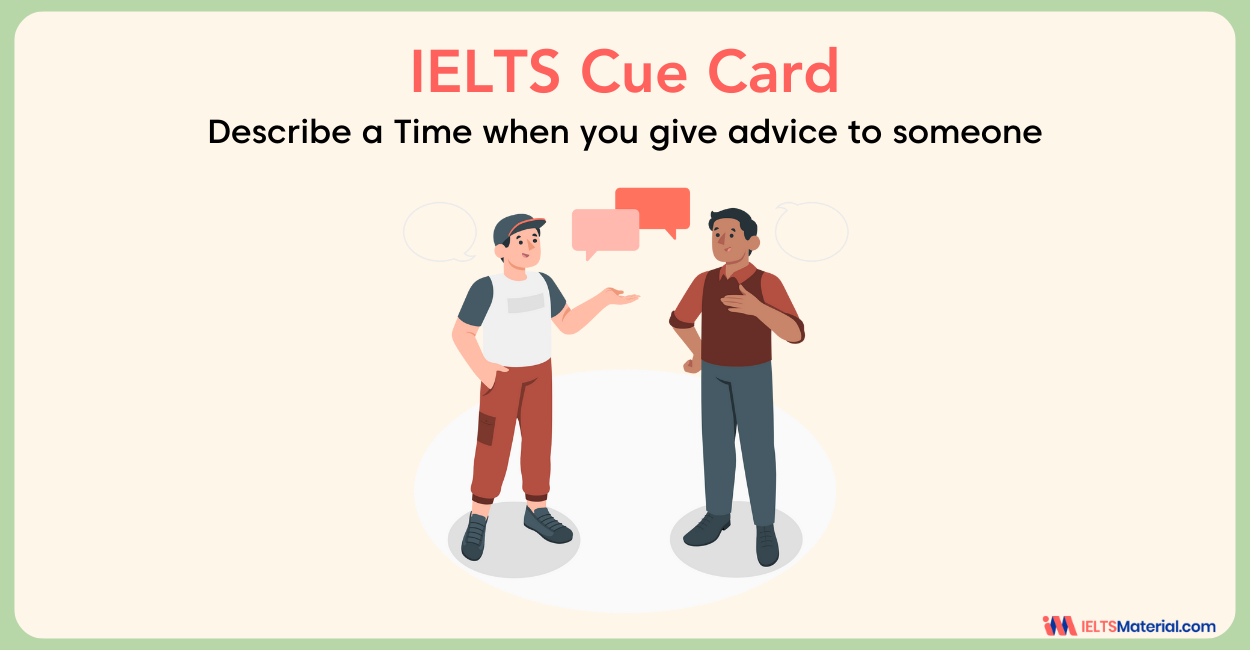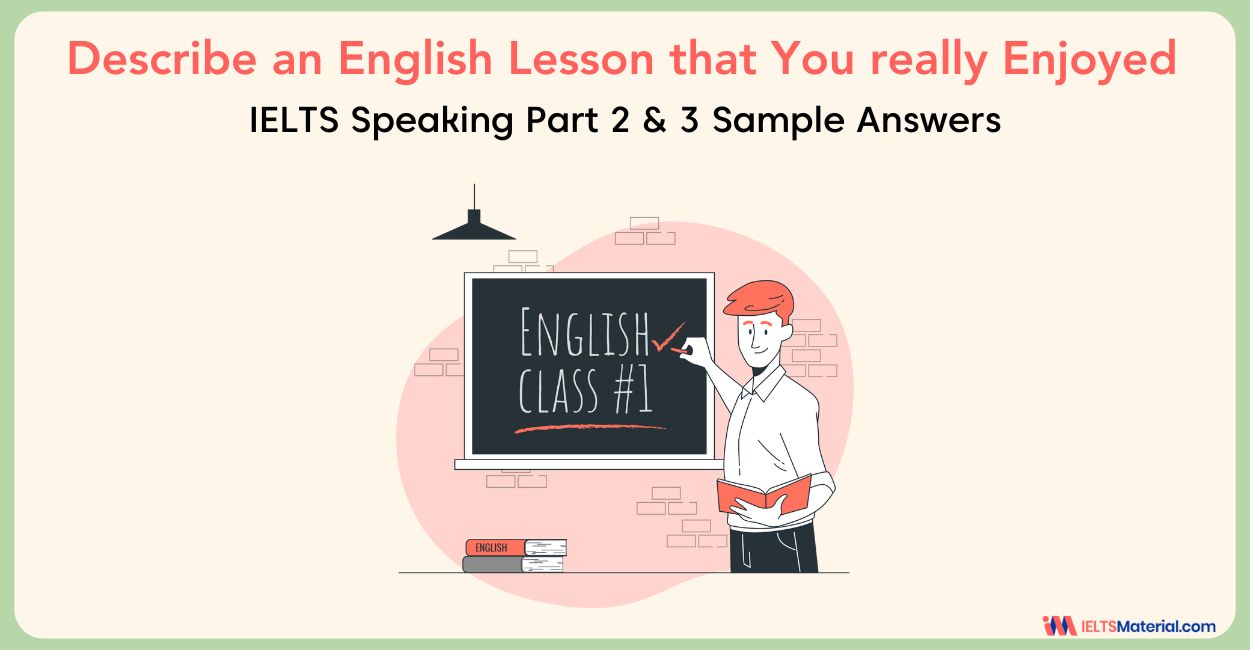Describe a future plan which is not related to work or study – IELTS Speaking Part 2 Sample Answer
Table of Contents

Limited-Time Offer : Access a FREE 10-Day IELTS Study Plan!
The IELTS Speaking Module is designed to assess your English Language Speaking Skills. To ensure a good score in the IELTS Speaking Module, you must study and practice the common Speaking Question types. Below is a sample Speaking Module with responses. By studying the sample answers, you can have a reference to begin drafting your own Speaking section answers.
Read Sample Answers for IELTS Speaking Part 2 to learn new vocabulary, collocations, idioms, phrasal verbs, etc and know how to answer the examiner effectively.
You can get an valuable ebook titled “IELTS Speaking Actual Tests & Sample Answers” to read Band 9.0 model answers for IELTS Speaking Actual Tests (Full 3 Parts) that appears in the IELTS speaking module from September to December 2017.
Describe a future plan which is not related to work or study
You should say:
- What it is
- Why you have this plan
- What you will need to do in order to make the plan
- How you think you will feel after you achieve this
Sample Answer 1
Here is the sample for “Describe a future plan which is not related to work or study” topic:
Almost everybody lives with a plan pertaining to their study or work. I consistently participate in short courses on the internet to ensure that I never cease acquiring new skills. For instance, I’ve taken classes for music, French language, sketching, and driving.
However, these days, I am planning to take up cooking and baking classes. There are quite a few reasons why I want to enroll in these classes.
One of the reasons behind this is that I am planning to migrate to Canada for my higher studies. Residing in a whole new country, with my mother not around, would compel me to cook. For this one reason, I am desperate to learn cooking, especially everything on the Indian menu, so that I’m not deprived of homely food. This will also help me survive well in the new country, and I would be able to avert the situation of eating out all the time.
Since I have a lot of friends and family members settled down in Canada without knowing how to cook, I certainly know the drill. In addition to this, if I know how to cook well, it will be easier for me to find a part-time job in a restaurant or a hotel.
Just in a matter of a few days, my vacations are commencing. So, during this time, with the help of my mother, I am thinking to upskill my cooking. My mother is an amazing cook. If I can learn even half of what she knows in cooking, everything will be sorted for me. And then, I am also thinking to get enrolled in some cookery courses being organized in my city.
My major preference will be learning Indian cuisine, especially Punjabi and South Indian. Apart from this, if I’ll have enough time in hand, I might also try my hands on the international menu, especially Chinese.
[do_widget id=custom_html-47]
Sample Answer 2
You may or may not notice, but we have run across at least one or two articles illustrating how people should live their lives to the fullest every single day. Reading them has struck me hard, that I haven’t tried doing something risky or adventurous enough in my life, which will somehow leave a regretful feeling to my older self when years come by. And that’s why I have scratched my original plan to settle down first, to make time for traveling for at least 3 months within the next 2 years.
It may sound far-fetched to give up your routine lifestyle and stable income to commit for long-term retreat which holds no guarantee to be beneficial for your next job, however, life is not always about the results but the experience. It will take serious time and effort to carefully prepare for the journey unless you want to let the grass grow under your feet. Fortunately, I am that type of person; hence, I have already sketched a plan. The first thing crossing my mind when thinking about travelling is money, which is also the most crucial tool in any situation. Saving up to the amount that can cover at least all my basic needs is the goal. Besides, it’s nearly impossible to truly discover local cultures without understanding them and languages can break any boundary. Therefore, based on the list of countries I would love to visit, I will try to learn a little about their languages as well as look into their cultures and customs to be able to communicate more efficiently and avoid taboos that visitors usually make. Emerging yourself in an entirely different nature and people will definitely change how you perceive the world and cultivate your appreciation with everything offered.
Vocabulary for Cue Card
Here are the vocabularies for “Describe a future plan which is not related to work or study” with examples:
- Run across (phrasal verb): meet or find by chance
Eg: Rose happened to run across John in the park last week. - Live life to the fullest: to fully enjoy one’s life
Eg: My grandma told me to live my life to the fullest. - Strike (v): (of a thought or an idea) to come into somebody’s mind suddenly
Eg: It’s just struck me that I still have to pay my bills. - Scratch (v): to decide that something cannot happen or somebody/something cannot take part in something, before it starts
Eg: After a heavy loss in the business, he decided to start from scratch. - Far-fetched (a): unlikely and unconvincing; implausible
Eg: The police thought her story was far-fetched. - Let the grass grow under your feet: delay in acting or taking an opportunity
Eg: Rose missed a lot of opportunities by letting the grass grow under her feet. - Sketch (v): to give a general description of something, giving only the basic facts
Eg: The artist made a sketch of the old building. - Boundary (n): a line that marks the limits of an area; a dividing line
Eg: Bay of Bengal is the boundary between India and Sri Lanka. - Taboo (n): considered so offensive or embarrassing that people must not mention it
Eg: Marriage between close cousins is considered to be a taboo in many cultures. - Perceive (v): to understand or think of somebody/something in a particular way
Eg: The villagers perceive the Minister to be a good man. - Cultivate (v): to develop an attitude, a way of talking or behaving, etc.
Eg: Children must be thought to cultivate good manners from childhood.
Related Cue Cards:
Also check :
- IELTS Speaking preparation tips
- Linking words for IELTS Speaking
- IELTS Speaking recent actual test
- IELTS Speaking Part 2
- Idioms for IELTS Speaking
- IELTS Pronunciation Guide
- Common English words in IELTS Speaking
- Ough words
Questions for Part 3
Which do you prefer? Having plans or having no plans?
I have inclination for becoming organized and prepared for upcoming challenges. Drawing up a plan in advance can equip people with some knowledge when something unexpected comes up, or when everything just doesn’t go according to plan. Without a plan, people can feel at a loss and have nothing to fall back on when they are in the face of adversity. However, it should be pointed out that we shouldn’t get into too much detail, instead, just getting the picture as to what’s gonna happen and how plan can be developed is enough for us to tackle it. I mean that plan there are a lot of external circumstances which preclude our detailed plan from coming true; as a result, there is no need to be too precise.
In general, do you think planning is important?
To be honest, I am a great planner and can hardly stick to my original plan. Yet, that’s what planning is all about. They say “plan to fail and fail to plan” for a reason. Even though I usually end up ruining my schedule, I make a habit of noting my thoughts and what I have to do the next day, next week and next month since I think it’s one of the best way to organize my mind and my life as well. Without a plan, even a generic one, you’re just going around without making any progress towards your goals and advance in your career. Therefore, making sure to keep track of my schedule and personal goals through planning is my top priority.
Why do people make plans?
Some believe planning is not for everyone since many wants to live spontaneously without thinking too much but others have different opinions. People are into planning since many benefits it may bring. Planning helps you clarify your goals, strategize your tactics and stay on track. Even if sometimes you mess it all up, you will eventually get back to your ultimate destination. Without a plan, you are simply lost in a maze of inconsequential decisions.
Vocabulary for Speaking Part 3
- Have inclination for (phrase) have a feeling that you want to do something
Eg: Rose had an inclination for helping the needy people - Draw up (phrasal verb) to prepare and write something such as a document or plan
Eg: A formal agreement was drawn up between the companies. - Equip somebody/something with something (phrase) to provide a person, object, or place with the things that they need for a particular purpose
Eg: The classrooms are well-equipped with modern technology. - Come up (phrasal verb) if a problem comes up, it happens and needs to be dealt with immediately
Eg: If you come up with a new idea, call me anytime. - To be at a loss (phrase) unable to know how to act or what to do
Eg: The Judge’s comments left him at a loss for words. - Fall back on (phrasal verb) to depend on something after a loss or failure
Eg: When he lost his business, he fell back on his savings. - Adversity (noun) a difficult period in your life in which you have many problems
Eg: Adversity happens to everyone. It is upon us to face it boldly. - Point out (phrasal verb) to tell someone something
Eg: The teacher pointed out her mistakes. - In detail (phrase) including many facts or aspects of a situation
Eg: The professor demanded the assignments to be in detail. - Get the picture (idiom) understand something
Eg:”Did you get the picture of what I am explaining to you?” - Preclude something from something (verb) if one thing precludes another, the first thing prevents the second one from happening
Eg: Although John has a disability, he never allows it to preclude him from living a content life - Precise (adj) exact and accurate
Eg: The panelists expect a precise answer from the students. - Make a habit of: to do something so often that it becomes a habit
Eg: Children must make a habit of greeting elders. - Make progress: to move forward in one’s work or activity
Eg: She made very good progress in her business. - Keep track of: to continue to know what is happening to something or someone
Eg: Mary kept track of her expenses. - Clarify (v): to make something clearer or easier to understand
Eg: Rose asked John to clarify what he meant. - Strategize (v): devise a strategy
Eg: The employees gathered together to strategize. - Ultimate (a): most extreme; best, worst, greatest, most important, etc.
Eg: It was an ultimate win for Australia. - Inconsequential (a): not important or worth considering
Eg: The police regarded her statements as inconsequential.

Start Preparing for IELTS: Get Your 10-Day Study Plan Today!
Explore other Speaking Part 2 Topics
Recent Articles

Nehasri Ravishenbagam

Kasturika Samanta









Post your Comments